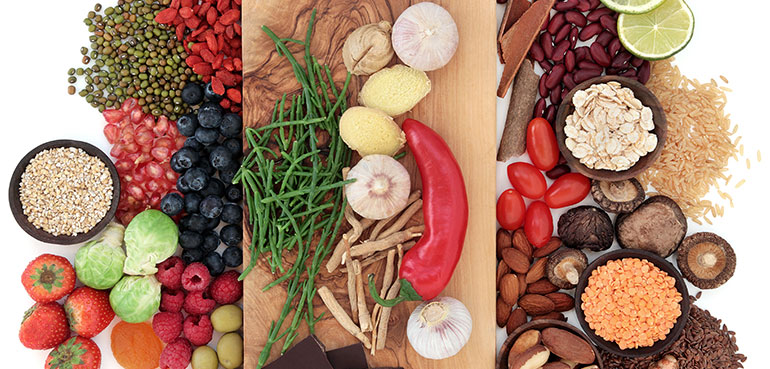Courtesy of ShopWell
The label “superfood” has become so trendy that it’s hard not to jump on board with whatever food is the next “it” item to add to your diet. There are more than 100 different foods in the market today that have been labeled as “superfoods” at some point. But what’s the deal with the “super” label? It’s a tough thing for any food to live up to as the end-all, be-all, cure-all miracle food of the moment. I have nothing against the foods that are labeled as “super,” as they are very healthy choices. My issue is with the label itself and how it can overshadow the basic tenants of eating healthy.
No particular food is by itself magical and special. There are plenty of whole foods – fruits, veggies, protein choices, spices, teas, and whole grains – that are packed full of nutrients and are healthy choices that should be included in your diet. It doesn’t matter if they are good sources of the super vitamin of the moment (ahem, looking at you vitamin D) or if they are the “it” food to eat. Like many fellow dietitians out there, I resist using the term “superfood” because it gives too much weight and importance to a single food. I would rather make the case for the underappreciated, but equally nutritious foods out there that should be part of a balanced healthy diet. These foods just don’t have a marketing campaign to make them seem less intimidating (side note: I still enjoy the New York Times marketing campaign video to create the broccoli craze). Instead of labeling foods as “superfoods,” we should call them “good-for-you” foods or “nutrition powerhouses” to give credit to the entire nutritional breakdown and more foods a chance in the spotlight.
The least sexy diet out there is the one that has the most staying power – eat as minimally processed as possible and focus on eating more whole foods. No gimmicks, guarantees, or catchy names with this eating pattern. Don’t just buy the superfood of the moment because it feels like something you should be doing. By paying more attention to what you are eating and taking an interest in making healthier food choices, you’ll find yourself naturally eating better. This is not to say you should stop eating kale, quinoa, spinach, walnuts, etc. Instead, consider eating healthy a team sport. No solitary star player can carry the team (eating kale doesn’t cancel out the ice cream you ate last night). Give new produce, grains, and proteins a try, even if they aren’t the “it” food of the moment. I dare you to make foods like beet greens and teff, nutrition powerhouses in their own right but lacking the “superfood” label, a part of your weekly meals.
What are some of the “good for you” foods that you eat on a weekly basis?

